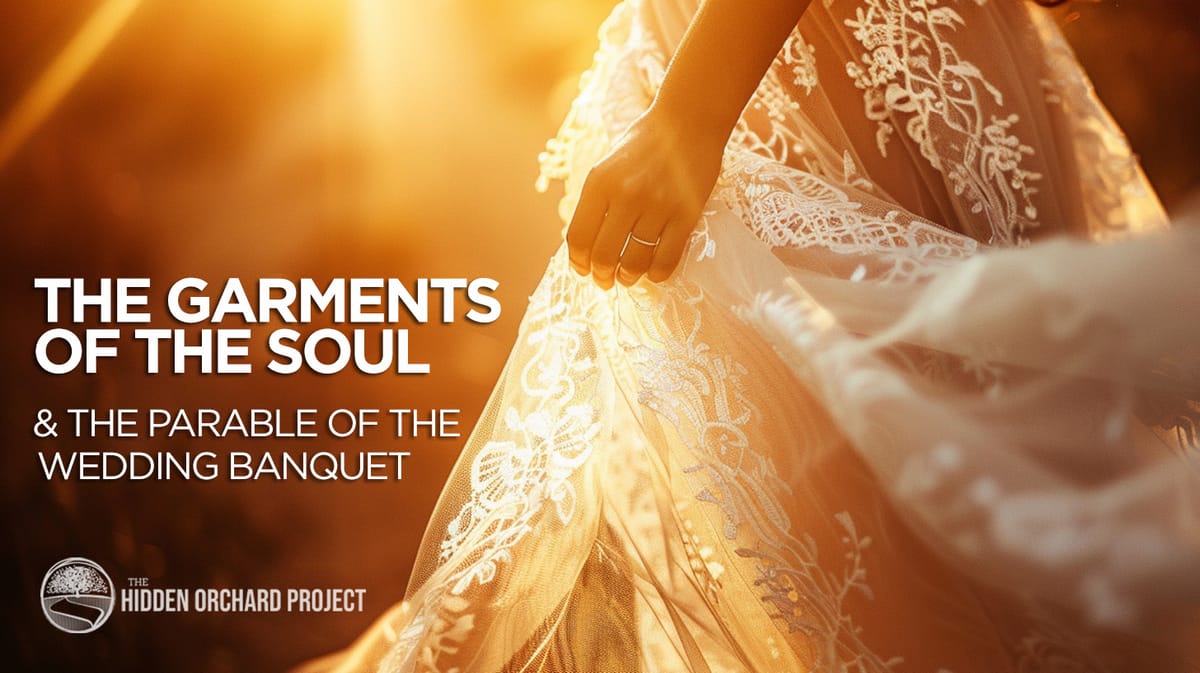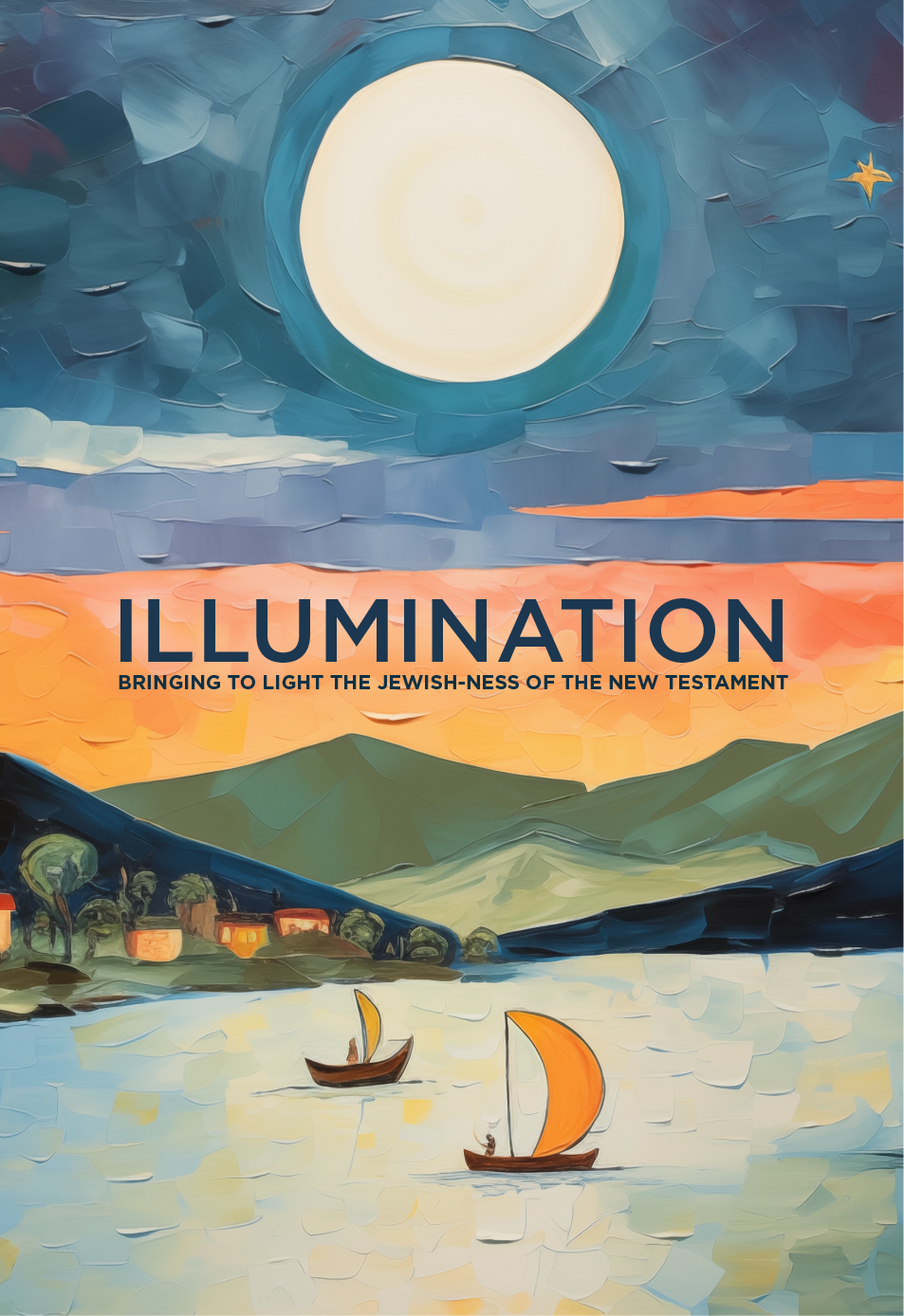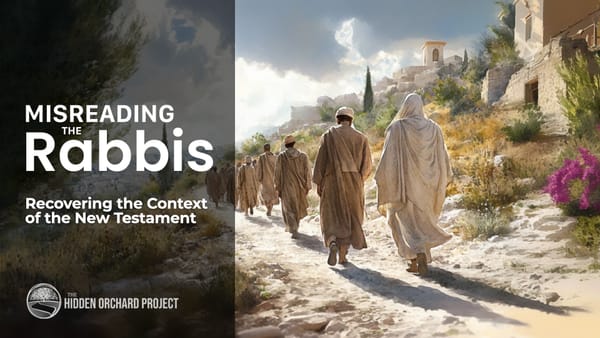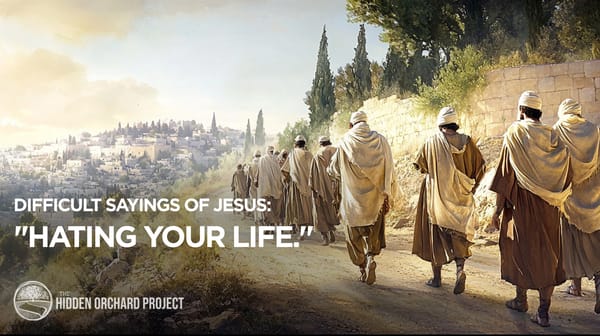The Garments of the Soul
The Garments of the Soul refer to our; deeds, words, and thoughts. When we understand these Rabbinic metaphors, we unlock a new insight into The Parable of the Wedding Banquet in the Gospel of Matthew.

This article has been adapted from a section of the book "Illumination. Bringing Light to the Jewish-ness of the New Testament."
The primary focus of Kabbalah is centered on spiritual development and the refinement of the soul¹. The language and metaphors are beautiful, creative, and elaborate - and can often be found in alignment with the language of the New Testament.
Garments of the Soul
In this tradition, it is believed that the soul enters its Earthly existence and must gradually learn to express itself via the unique capabilities endowed to humankind; our Deeds, Speech, and Thoughts.
Deeds
Our deeds correlate to our physicality. As infants, we begin moving our hands and feet, pointing to what we want, and using our bodies to procure what we need to survive. In time, we will develop coordination for more complex tasks and functions.
Speech
Later, we develop into the next level of expression, speech. Primitive at first, we eventually become more skilled at this form of expression, communicating with others around us. Speech is innately influenced by our emotions and becomes a domain for more complex applications as we mature.
Thoughts
Lastly, we begin to develop our intellect which is associated with our thoughts. We put our minds to work, creating, building, enjoying leisure, building a livelihood, and everything in between.
In Rabbinic thought, these (3) faculties are called the Garments of the Soul. And, all of them are interrelated. We will explore this metaphor shortly, but simply stated, every time we live into the wisdom of the Torah, we create a pure and dazzling [spiritual] garment that enshrouds our soul.
When the soul passes from this world to the next, it becomes clothed in the garment it acquired for itself in this life.
"Upon death, a person is divested of the garment of the body and instead becomes clothed in a spiritual, rarified and pure garment." - Gates of Holiness, R. Chaim Vital
The spiritual quality of this garment is entirely up to us and is based on how we live in accordance with the Torah's principles.
In a practical sense, we should give charity, pray, clean up our language², and even attempt to shift the quality of our thoughts to positivity and wholesomeness. When we combine them, we can reach new heights.
Nakedness
The inverse is true as well. Failure to carry out the commandments (mitzvot) incumbent upon us brings us to a kind of spiritual blemish. This is also called "nakedness".
This idea goes back to the Garden of Eden where Adam, initially, was said to have been covered from head to toe in a kind of radiant light. However, after their sin, Adam and Eve fell into a state of nakedness³.
In the Midrash⁴, nakedness, or a soiled garment correlates to a lack of obedience to the Torah. Commenting on this tradition, Rashi states:
AND THEY KNEW THAT THEY WERE NAKED — Even a blind person knows when he is naked! What then does “and they knew that they were naked” signify? One charge had been entrusted to them and they now knew they had stripped themselves of it (Genesis Rabbah 19:6). - Rashi
This metaphor is prolific throughout Rabbinic literature.
Garments of Light
In the Zohar, we read:
Come and see, woe to those humans who do not contemplate or know or recognize the foundation of their existence, and who are oblivious to fulfilling the commandments of Torah!
For we have learned; Certain commandments of Torah fashion garments of glory above, certain commandments of Torah fashion garments of glory below, and certain commandments of Torah fashion garments of glory for this world. A person needs them all, and they are all woven from his actual days, as we have established. - Zohar 1:226b
In essence, we learn that each day provides us with new opportunities to attain treasure in the World to Come. This echoes Jesus’s famous passage in the Sermon on the Mount to “store up treasures in Heaven.”
On the other hand, if one were to spend a significant amount of time in sin, they would have failed to attain a garment of glory for their soul to wear to the Messianic banquet⁵.
In addition, some suggest the life review their soul endures upon leaving this world will cause great embarrassment to them for not having spent their time more wisely.
The Parable of the Wedding Banquet
Let’s carry these ideas into a famous parable of Jesus’s in Matthew.
““And again Jesus spoke to them in parables, saying, “The kingdom of heaven may be compared to a king who gave a wedding feast for his son, and sent his servants to call those who were invited to the wedding feast, but they would not come...
The king was angry, and he sent his troops and destroyed those murderers and burned their city. Then he said to his servants, ‘The wedding feast is ready, but those invited were not worthy. Go therefore to the main roads and invite to the wedding feast as many as you find.’ And those servants went out into the roads and gathered all whom they found, both bad and good. So the wedding hall was filled with guests.
But when the king came in to look at the guests, he saw there a man who had no wedding garment. And he said to him, ‘Friend, how did you get in here without a wedding garment?’ And he was speechless.
Then the king said to the attendants, ‘Bind him hand and foot and cast him into the outer darkness. In that place there will be weeping and gnashing of teeth.’ For many are called, but few are chosen.”” - Matthew 22:1-14
The Rabbinic Metaphors at Play
The King represents the Creator, and the son seems to represent Messiah. The scene of this parable builds towards the Wedding banquet, which is often a hint of the Messianic Kingdom. We get a glimpse of this in other places, namely the Wedding at Cana⁶.
Growing up, this story always puzzled me. It made sense that the King would be angry with those who rejected his invitation. But, how can the King be surprised or angry that people who were just invited off of the streets were not dressed in proper attire? Of course, they would not be prepared, they were only just invited!
However, once we overlay the elements from the Jewish tradition, we see the problem more clearly. It seems to imply all of us are measured by the Torah - at all times - whether we are aware of our responsibilities or not.
Similar to other related parables of Jesus⁷, we are taught that one must always be vigilant and await the arrival of the Kingdom.
In this parable, given the state of his clothing, it would seem the man had not made good use of his time, and was punished for this. He was dealt with rather harshly, despite his ignorance.
We learn that there are no free passes.
Once again, we see alignment in these ideas. Jesus, (along with the Sages of the Talmud and the Zohar) taught to live in a state of vigilance, always striving to seek and apply the wisdom of the Torah to greater heights, preparing our souls for the World to Come.

llumination. Bringing to Light the Jewish-ness of the New Testament
A journey of enlightenment, uncovering the hidden layers of the New Testament, and bringing to light the deep Rabbinic influences found within its pages.
This book offers readers a fresh perspective that transcends traditional interpretations and reveals a deeper understanding of the ideas and traditions that have profoundly influenced the world.
Selected essays from The Hidden Orchard Project have been compiled and curated to delve deeply into the intricacies and complexities of first-century Judaism.
Notes:
¹ The Soul Program: https://www.thehiddenorchard.com/the-soul-program/
³ “Then the eyes of both of them were opened and they perceived that they were naked; and they sewed together fig leaves and made themselves loincloths”. - Genesis 3:7
⁴ What is Midrash?: https://www.thehiddenorchard.com/derash/
⁵ Zohar 1:224b
⁶ Water to Wine: https://www.thehiddenorchard.com/from-water-to-wine/
⁷ Parable of the Bridesmaids: https://www.thehiddenorchard.com/the-parable-of-the-bridesmaids/





